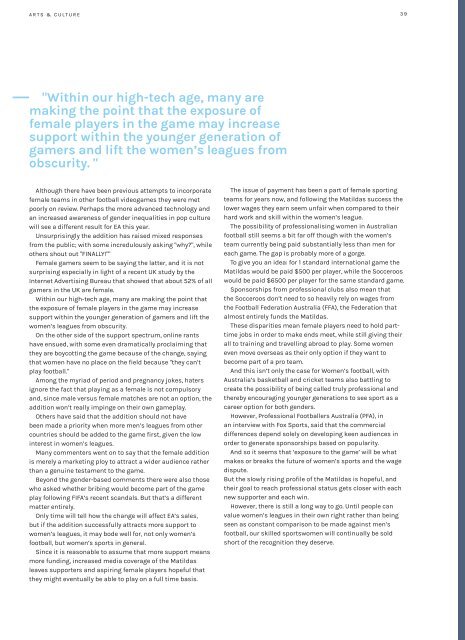Create successful ePaper yourself
Turn your PDF publications into a flip-book with our unique Google optimized e-Paper software.
ARTS & CULTURE 39<br />
"Within our high-tech age, many are<br />
making the point that the exposure of<br />
female players in the game may increase<br />
support within the younger generation of<br />
gamers and lift the women’s leagues from<br />
obscurity. "<br />
Although there have been previous attempts to incorporate<br />
female teams in other football videogames they were met<br />
poorly on review. Perhaps the more advanced technology and<br />
an increased awareness of gender inequalities in pop culture<br />
will see a different result for EA this year.<br />
Unsurprisingly the addition has raised mixed responses<br />
from the public; with some incredulously asking "why?", while<br />
others shout out "FINALLY!""<br />
Female gamers seem to be saying the latter, and it is not<br />
surprising especially in light of a recent UK study by the<br />
Internet Advertising Bureau that showed that about 52% of all<br />
gamers in the UK are female.<br />
Within our high-tech age, many are making the point that<br />
the exposure of female players in the game may increase<br />
support within the younger generation of gamers and lift the<br />
women’s leagues from obscurity.<br />
On the other side of the support spectrum, online rants<br />
have ensued, with some even dramatically proclaiming that<br />
they are boycotting the game because of the change, saying<br />
that women have no place on the field because "they can’t<br />
play football."<br />
Among the myriad of period and pregnancy jokes, haters<br />
ignore the fact that playing as a female is not compulsory<br />
and, since male versus female matches are not an option, the<br />
addition won’t really impinge on their own gameplay.<br />
Others have said that the addition should not have<br />
been made a priority when more men’s leagues from other<br />
countries should be added to the game first, given the low<br />
interest in women’s leagues.<br />
Many commenters went on to say that the female addition<br />
is merely a marketing ploy to attract a wider audience rather<br />
than a genuine testament to the game.<br />
Beyond the gender-based comments there were also those<br />
who asked whether bribing would become part of the game<br />
play following FIFA’s recent scandals. But that’s a different<br />
matter entirely.<br />
Only time will tell how the change will affect EA’s sales,<br />
but if the addition successfully attracts more support to<br />
women’s leagues, it may bode well for, not only women’s<br />
football, but women’s sports in general.<br />
Since it is reasonable to assume that more support means<br />
more funding, increased media coverage of the Matildas<br />
leaves supporters and aspiring female players hopeful that<br />
they might eventually be able to play on a full time basis.<br />
The issue of payment has been a part of female sporting<br />
teams for years now, and following the Matildas success the<br />
lower wages they earn seem unfair when compared to their<br />
hard work and skill within the women’s league.<br />
The possibility of professionalising women in Australian<br />
football still seems a bit far off though with the women’s<br />
team currently being paid substantially less than men for<br />
each game. The gap is probably more of a gorge.<br />
To give you an idea: for 1 standard international game the<br />
Matildas would be paid $500 per player, while the Socceroos<br />
would be paid $6500 per player for the same standard game.<br />
Sponsorships from professional clubs also mean that<br />
the Socceroos don’t need to so heavily rely on wages from<br />
the Football Federation Australia (FFA), the Federation that<br />
almost entirely funds the Matildas.<br />
These disparities mean female players need to hold parttime<br />
jobs in order to make ends meet, while still giving their<br />
all to training and travelling abroad to play. Some women<br />
even move overseas as their only option if they want to<br />
become part of a pro team.<br />
And this isn’t only the case for Women’s football, with<br />
Australia’s basketball and cricket teams also battling to<br />
create the possibility of being called truly professional and<br />
thereby encouraging younger generations to see sport as a<br />
career option for both genders.<br />
However, Professional Footballers Australia (PFA), in<br />
an interview with Fox Sports, said that the commercial<br />
differences depend solely on developing keen audiences in<br />
order to generate sponsorships based on popularity.<br />
And so it seems that ‘exposure to the game’ will be what<br />
makes or breaks the future of women’s sports and the wage<br />
dispute.<br />
But the slowly rising profile of the Matildas is hopeful, and<br />
their goal to reach professional status gets closer with each<br />
new supporter and each win.<br />
However, there is still a long way to go. Until people can<br />
value women’s leagues in their own right rather than being<br />
seen as constant comparison to be made against men’s<br />
football, our skilled sportswomen will continually be sold<br />
short of the recognition they deserve.


















